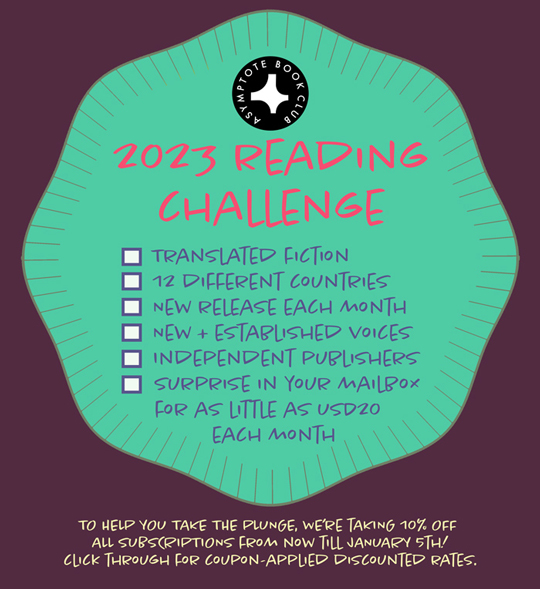
Posts filed under 'Asymptote Book Club'
You’re Invited: Join our 2024 Reading Challenge!

Is reading adventurously one of your New Year’s resolutions? We can help with that!
The Best Gift This Holiday Season

Who doesn’t love a year of adventurous reads—chosen from the latest in translation and delivered directly to their door?
A Weird Alchemy of Taste and Determination: Speaking with Taylor Bradley of Honford Star

That’s what is cool about Specters—it tries to explore how government censorship affects the world of art.
South Korean author Hwang Yeo Jung’s scintillating, multi-layered novel, The Specters of Algeria, was our Book Club selection for the month of April; in a narrative that holds fictions inside facts, facts inside fictions, Hwang brilliantly builds and unravels with the double-speak and intimate language of life under authoritarian governance. This invigorating book has come to us by way of the East Asia-centric publisher Honford Star, a small press that has continued to undertake the vital and thrilling work of bringing groundbreaking writers to English-language audiences. In this following interview, Laurel Taylor speaks with the co-founder of Honford Star, Taylor Bradley, about their process from obtaining rights to publication, their mission and goals, and why The Specters of Algeria is such a special title.
The Asymptote Book Club aspires to bring the best in translated fiction every month to readers around the world. You can sign up to receive next month’s selection on our website for as little as USD20 per book; once you’re a member, join our Facebook group for exclusive book club discussions and receive invitations to our members-only Zoom interviews with the author or the translator of each title.
Laurel Taylor (LT): It’s been six years since Honford Star’s founding. What led you and your co-founder Anthony Bird to form this new publishing house?
Taylor Bradley (TB): Anthony and I had known each other since 2008, when we were both English teachers at the same school in Korea. Fast forward to 2015, my wife and I were on our honeymoon in London, where we met up with Anthony and his wife for a pint at this 300-year-old pub called the Chesire Cheese. Charles Dickens was a regular there, and perhaps feeling the inspiration of the Ghost of Literature Past, Anthony and I talked about how nice it would be to have a publishing company. I continued on my honeymoon and didn’t think about the conversation again until a few months later, when Anthony messaged saying he wants to publish the classic Korean author Kim Dong-in and asked me if I want in. I said yes.
Our purpose for starting a new publishing company was to bring a broader range of East Asian stories into English. At the time, we felt the types of books being published were from an extremely narrow band. For example, there hadn’t been much, if any, Korean sci-fi translated into English. We hoped to bring things from areas like classic literature, sci-fi, and queer fiction into English. Fortunately, I think that the translated field has changed a lot in the past eight years, thanks to the efforts of indie and university presses.
LT: You and Anthony were both already working in the publishing sphere prior to Honford Star’s founding, but I’m wondering if there been any unexpected challenges along the way? Unexpected rewards?
TB: We did have experience with printing and publishing, but we had never been in charge of doing an entire book. So finding good translators, editors, artists, printers, distributor, publicists, and sales team has been a journey of trial and error. We’ve been fortunate that our network has really grown into strong group of collaborators, and we have a great printer in Korea that can make the most gorgeous books. Our sales team are a group of wizards, and the distributor is very reliable. READ MORE…
Are you game for our New Year reading challenge?

Discover the latest and greatest of world literature, curated by our award-winning team!
This New Year, pledge to read diversely by joining the only Book Club that partners with indie publishers on both sides of the Atlantic! To help you take the plunge, we’re taking 10% off all Book Club subscriptions from now till 2359hrs, January 5th. A steeper discount is available for group subscriptions—inquire via bookclub@asymptotejournal.com.
Every Word Counts: Chip Rossetti on Translating Diaa Jubaili’s No Windmills in Basra

Flash fiction is more like someone grabbing you by the lapels and then sending you on your way.
For the month of September, our Book Club selection Diaa Jubaili’s No Windmills in Basra, a visionary collection of short fiction that works from Iraq’s expansive folktale tradition to create vivid, surprising portrayals of the country’s complex present. In precise, yet fantastic prose, Jubaili jumps rope with the tight limits of short story to range from humour to darkness, from imagination to reality, from violence to tenderness. In the following interview, Laurel Taylor speaks to the translator of No Windmills in Basra, Chip Rossetti, on formalism, intertextuality, and the use of symbolism in Jubaili’s work.
The Asymptote Book Club aspires to bring the best in translated fiction every month to readers around the world. You can sign up to receive next month’s selection on our website for as little as USD15 per book; once you’re a member, join our Facebook group for exclusive book club discussions and receive invitations to our members-only Zoom interviews with the author or the translator of each title.
Laurel Taylor (LT): You’ve mentioned that Jubaili’s work was the first flash fiction you had read in Arabic, and also that the genre is still very new in Arabic. To what extent are you thinking about formalism as you translate something that is a known genre in English but perhaps less so in Arabic?
Chip Rossetti (CR): It’s interesting, as the short story’s both a very old and a very new phenomenon in Arabic. The earliest form of prose narrative in Arabic is the khabar, which is a very short sort of text. One example of its earliest use is the hadith, accounts of things the Prophet Muhammad once said or did, and a khabar could be a paragraph long, or a few sentences. Khabar were always preceded by a citation of its oral sources, such as “I heard this account from someone, who heard it from somebody else who heard it from somebody else.” So there’s a chain of transmission, and that’s what scholars always point to as the very core, the oldest examples of prose texts in Arabic. Of course, that’s fourteen hundred years ago. That’s a far cry from modern short stories.
There are, as I think I mentioned in the introduction to No Windmills in Basra, some other practitioners of flash fiction in Arabic—notably the Syrian author Zakariya Tamer who is, I think, in his nineties now. He’s also done very short stories, but the contemporary boom in flash fiction started making its way into Arabic much more recently than in English. The challenge, as I understand it—and I’ve tried my hand at writing English-language flash fiction—is the intensity required of the writer. The challenge for a translator of flash fiction is to mirror that same intensity in the translation. Obviously, every word counted for Jubaili when he wrote it in the original, so I’ve tried to make sure I’m keeping that emotional punch in a way that inevitably brings you to each story’s end: an ending that comes sooner than you might expect, but is still somehow satisfying. READ MORE…
Announcing Our November Book Club Selection: Home Reading Service by Fabio Morábito

It’s rare for a novel to so deftly balance character and plot. It’s even rarer for a complex plot to sprout from such unlikely sources . . .
A winner of Mexico’s prestigious Xavier Villaurrutia Award, Fabio Morábito’s El lector a domicilio is the first of his works to appear in English—and having read it, we can only hope there’s more to come. It’s hard to think of recent novels as well-rounded as this, which is why we’re delighted to announce it as our November Book Club pick: in just over two hundred pages, it delivers rich characters and riveting plots; it balances heart with humor; it sets us up only to shake our assumptions. More importantly, though, it finds value in lives that are often neglected, prompting us to fully see, hear, and touch those around us—an especially timely reminder as we continue to emerge from our pandemic solitudes.
The Asymptote Book Club aspires to bring the best in translated fiction every month to readers around the world. You can sign up to receive next month’s selection on our website for as little as USD15 per book; once you’re a member, join our Facebook group for exclusive book club discussions and receive invitations to our members-only Zoom interviews with the author or the translator of each title.
Home Reading Service by Fabio Morábito, translated from the Spanish by Curtis Bauer, Other Press, 2021
If ever a novel was deviously set up for stasis, it’s Fabio Morábito’s latest. Its protagonist, thirty-four-year-old Eduardo Valverde, is “stuck in second gear” after a case of reckless driving costs him his license, part of his job, and much of his time. Already living at home with an ailing father, he must now serve as a home reader to some of the other “elderly and infirm” in Cuernavaca—many of whom spend their days alone or half-silently with others, in dim rooms at the end of long passageways. Meanwhile, Eduardo has either cut or strained all ties with friends and family, and doesn’t seem keen on forming new ones; he, too, lives in “his own little world,” and while his court-mandated gig beats scrubbing public toilets, his heart just isn’t in it.
This is apparent to several of his listeners. “You come to our house,” one berates him, “sit on our sofa, open your briefcase, and with that magnificent voice of yours you read without understanding anything, as if we weren’t worthy of your attention.” To be fair, though, he’s not exactly dealing with a rapt audience. The Jiménez brothers are more eager to taunt him with vocal antics than take in Dostoevsky’s Crime and Punishment; the Vigils lose focus on Verne’s The Mysterious Island when they can’t read his lips (they appear to be deaf), and they don’t bother to mention it until he brings it up; Coronel Atarriaga drifts off like clockwork after two or three pages of Buzzati’s The Tartar Steppe.
The characters’ mix of decrepitude, distance, and detachment sprouts from their broader environment. Once worthy of its nickname as the “City of Eternal Spring,” Cuernavaca has long since been “expelling young people and keeping only the old-timers around, like any godforsaken town of emigrants”—even “the bougainvillea on the fences are rotting.” The remaining population lives “closed up in houses and yards surrounded by high walls,” and these walls have “infected” them: “everyone walk[s] around stone-faced.” It is the product of “unchecked danger” at the hands of drug lords and mobsters, one of whom routinely visits the Valverde furniture store to collect a “protection fee.” But even this rattling occurrence is mentioned almost in passing, thus avoiding the immediate strike of conflict. The novel’s context in its first few dozen pages, then, seems hardly ripe for character or plot development. READ MORE…
Announcing Our September Book Club Selection: Kaya Days by Carl de Souza

De Souza’s densely packed novel is a disorienting one, purposefully so.
Carl de Souza began writing Kaya Days in the tumultuous throes of the very event it depicts—the 1999 riots in the East African island of Mauritius, following the death of popular singer Kaya. From the description of those frenzied days comes a work that renders the electric immediacy of sensation with vividness, kinetics, and a musician’s aptness for rhythm. We are proud to announce this singular work as our Book Club selection for the month of September—a formidable voice in Mauritian literature and an unforgettable novel of revolution, poetry, and becoming.
The Asymptote Book Club aspires to bring the best in translated fiction every month to readers around the world. You can sign up to receive next month’s selection on our website for as little as USD15 per book; once you’re a member, join our Facebook group for exclusive book club discussions and receive invitations to our members-only Zoom interviews with the author or the translator of each title.
Kaya Days by Carl de Souza, translated from the French by Jeffrey Zuckerman, Two Lines Press, 2021
If war is a matter of hurry up and wait, then the rest of life is often the opposite. As Hemingway says, “Gradually, then suddenly.” So it is with Santee Bissoonlall and her mystical journey in Carl de Souza’s Kaya Days, translated from the French by Jeffrey Zuckerman—“. . . all this had happened gradually, with the quiet of a new beginning.” For many years, Santee is a child. Then suddenly, over the course of a violent and chaotic few days, she is a woman, a queen, a figure receding. De Souza’s intricate novel propels her on the journey of becoming, as she traverses the tumultuous 1999 Mauritian riots.
The riots were an uprising of Mauritian Creoles following the death of Joseph Réginald Topize—better known by his stage name, Kaya—in police custody under suspect circumstances. The word kaya is a reference to Bob Marley’s 1978 album of the same name, and Kaya, as a musician, was a pivotal figure in the blending of Mauritian sega and reggae into a genre that would come to be known as seggae. He was also an activist for Creole rights and the decriminalization of marijuana, among other things. Yet this political-historical thread is not the primary melody of de Souza’s novel; rather, it serves as the thrumming pedal note to Santee’s journey through the burning streets.
We follow her as she quests for her lost brother, Ramesh—younger than her yet seemingly so much worldlier, as he has been permitted to attend school and traverse the outside world, while Santee has been kept at home, condemned to household drudgery by her sex and her family’s poverty. For Santee, the confusion of the riots is a distant rumble; it is the more immediate problem of a missing sibling which drives her on through the ruined streets.
It was getting dark under the mango trees. She had no hope of understanding, but that wasn’t what she needed to do, that wasn’t her job, she was just here because Ma couldn’t be. What she needed to do was find Ram; one of these alleys would lead to him, but which one?
Announcing A Three-Day Flash Sale!

Even better than ice cream in August, our Book Club will take your reading to the next level!
Splash into savings this August with a special 10% discount off three-month Asymptote Book Club subscriptions, now fortified with monthly Zoom Q&As with the author and/or translator of each title. Offer ends Aug 15, so don’t wait: Try our Book Club for as little as USD15 a month!
BONUS: If you’re among our first five new subscribers, we’ll even throw in our July Book Club title for free!
Announcing Our July Book Club Selection: The Animal Days by Keila Vall de la Ville

Keila Vall de la Ville’s third work of fiction—and the first to be translated into English—invites readers into the climber’s rootless milieu.
Keila Vall de la Ville’s The Animal Days explores young adulthood at high altitude. The narrator pursues a passion for rock climbing as she struggles to navigate a similarly perilous life at home. But the world of climbing and her escape from civilization come with their own dangers, which close in as the narrative hurtles toward a suspenseful finale.
The Asymptote Book Club aspires to bring the best in translated fiction every month to readers around the world. You can sign up to receive next month’s selection on our website for as little as USD15 per book; once you’re a member, join our Facebook group for exclusive book club discussions and receive invitations to our members-only Zoom interviews with the author or the translator of each title.
The Animal Days by Keila Vall de la Ville, translated from the Spanish by Robin Myers, Katakana Editores, 2021
Rock climbing invites glib metaphors. Inspirational posters—prolific in offices where the only vertical challenge is conquered at the touch of an elevator button—often use summits to symbolize widely held values like perseverance and determination, but the experience of serious climbers is anything but universal. Their insular world trades on levels of pain, risk, and anticipation foreign to the average individual. Enough time in that world can warp perceptions of the other world—the one where the rest of us live. “Thanks to the mountain, you’re able to make out the mechanisms that dictate daily life, life on land. You come back different,” explains Julia, the young narrator of The Animal Days. “Now that your battery has been recharged, now that you’ve obtained this ultraviolet vision, you carry on until you need to plug back into the mountain again. Until everything starts to lose its luster.”
The Animal Days, Keila Vall de la Ville’s third work of fiction and the first to be translated into English, invites readers into the climber’s rootless milieu. Julia’s journey is a world tour of precipices, as she balances her obligations to her dying mother against an escapism inherited from her absent father. Estranged from her everyday surroundings, she finds intimacy among her climbing friends, who provide a respite from her internalized abandonment, and who alone can understand the peaks and falls of a life on ropes. They shirk steady jobs and spend their time chasing both chemical and literal highs.
Constructing Unity From the Fragments of Living: Magda Cârneci and Sean Cotter on FEM

Poetry, as I use it, is a mystical way to attain certain states of mind and soul.
Magda Cârneci is a luminary. Writing in the vein of what Beauvoir called the artist’s need to “will freedom in [themselves] and universally,” her novel FEM is a feat of feminine imagination, at once within and beyond the body. Structured in a fluid prose but intricate with poetry’s capacities to manifest the numinous, the resulting text is an immensely powerful excursion within the mysteries of the mind as it meets the mysteries of the universe. We are proud to feature FEM as our Book Club selection for the month of June, and also to speak to Cârneci alongside translater Sean Cotter in a live interview held for members. The conversation, transcribed below, touches on the intricacies of contemporary Romanian literature, the legacy of French feminism, and the transcendental experiences of everyday life.
The Asymptote Book Club aspires to bring the best in translated fiction every month to readers around the world. You can sign up to receive next month’s selection on our website for as little as USD15 per book; once you’re a member, join our Facebook group for exclusive Book Club discussions and receive invitations to our members-only Zoom Q&As with the author or the translator of each title!
Andreea Iulia Scridon (AIS): Magda—you’re probably best known as a poet, but could you tell us about your history of writing fiction—or should I say prose? Did this represent a transition; were there anxieties about this process, or did it come naturally to you?
Magda Cârneci (MC): I used to write poetry, but at a certain moment, I realized that poetry is less read than prose, and the audience, unfortunately, is less numerous than it is for fiction. And as I had a message to transmit and some obsessions to confess, I felt the need to use fiction—the narrative as a tool, as a literary tool. It’s true that the prose form gives you possibilities which do not exist in poetry: describing and analysing feelings, or perceptions, or sensations in a minute way. So from this point of view, prose writing was a marvelous discovery for me. But I have to say that I mingle prose and poetry; I use poetry a lot in my writing, because I think it is a way of charging words with an intensity and with an aura of feelings. That does not exist in normal prose writing. So this is a kind of poetic prose or visionary prose, what I do in FEM.
AIS: Sean wrote a very interesting study called Literary Translation and the Idea of a Minor Romania, which I recommend to anybody interested in comparative literature, actually. So Sean, I was wondering if you could tell us what you think Romanian literature in particular is defined by, insomuch as it as possible to define a literature briefly, and what it brings to the corpus of world literature or global literature in particular.
Sean Cotter (SC): I don’t think that there’s an essence that would unite all Romanian literature in a useful way; what I would recommend is a difference in perspective when it comes to reading Romanian literature or understanding its history as a whole. This is something I addressed in the book—that in contrast to our usual ways of looking at national literatures (especially literature in the United States), I think we have to pay much more attention, when reading Romanian literature, to its interactions with other literatures. I think it’s much easier to misunderstand what is happening and why things changed, or why new things develop within Romanian literature, if we don’t attempt to document such interactions—and I think that FEM is a great example of this. READ MORE…
Announcing Our June Book Club Selection: FEM by Magda Cârneci

Cârneci's protagonist is a modern Scheherazade—or is she?
The persuasive potentials of storytelling don’t always hold the life-or-death thrill that they did for the mythical Scheherazade, who spun her narratives to stay alive, but as the profundities of Magda Cârneci’s FEM prove, there is always an enchantment in speaking one’s own experiences to another. Exalted with Cârneci’s celebrated poetics and visceral in its discernment of gendered bodies, our Book Club selection for June is a novel that speaks to our evolving understandings of physicality, sexuality, and selfhood as refracted in societal prisms of sex, femininity, and myth.
The Asymptote Book Club aspires to bring the best in translated fiction every month to readers around the world. You can sign up to receive next month’s selection on our website for as little as USD15 per book; once you’re a member, join our Facebook group for exclusive Book Club discussions and receive invitations to our members-only Zoom Q&As with the author or the translator of each title!
FEM by Magda Cârneci, translated from the Romanian by Sean Cotter, Deep Vellum, 2021
In the very first lines of FEM, the protagonist—a fictionalized version of author Magda Cârneci—compares herself to the mythical heroine Scheherazade, then immediately troubles the comparison: “A little, everyday Scheherazade in an ordinary neighborhood, in a provincial city; your personal Scheherazade, even if you won’t cut my head off in the morning, when I fail to keep you awake all night with extraordinary stories.”
How, then, is she like Scheherazade? She will indeed attempt to enchant her listener, a lover, with a string of stories—but are all women who tell stories like Scheherazade? It is not a simple affinity between the two women that gives meaning to the comparison, but, more fruitfully, the symmetry’s imprecision. Like the north ends of two magnets, the two storytellers’ refusal to meet tantalizes, inviting the reader into the no-man’s land, in which they may question—or even participate in this exchange of identities. Cârneci’s own active approach to living in a body, in fact, is exactly what she begs her listener/reader to adopt, and her appeal is so breathtaking, it’s a wonder anyone could refuse:
We are seeds sown into the brown-black loam of a terrestrial existence, and we must germinate and rise slowly from our fragile burgeoning, our green sprouting, through layers of clay and stone, through bacteria, worms, and insects that wish to devour us, we must pierce through sheets of underground water and enemy root systems, our germinations are deviated by contrary forces, deceived by gravitations and visions, by temptations and traps, but pulled upward by an atavistic, core instinct, along a fragile thread of light, pulled by an inverted, celestial gravity, we are tractable, attracted toward growth at any price . . .




